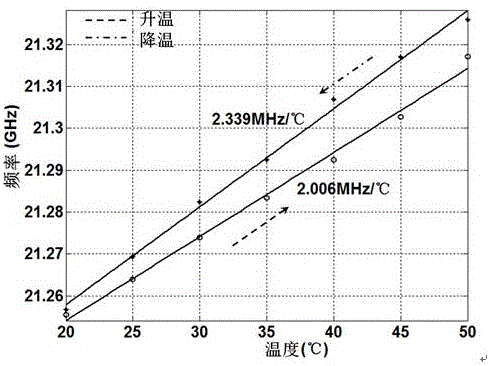Optical fiber temperature sensor based on multi-wavelength Brillouin fiber laser
A fiber laser and fiber temperature technology, which is applied to thermometers, thermometers, instruments, etc. with physical/chemical changes, can solve the problems of reducing system response speed, inapplicability, and inability to achieve high-precision and high-sensitivity temperature measurement at the same time. Effect of improved sensitivity and high temperature sensitivity
- Summary
- Abstract
- Description
- Claims
- Application Information
AI Technical Summary
Problems solved by technology
Method used
Image
Examples
Embodiment Construction
[0023] The specific implementation manners of the present invention will be further described below.
[0024] As described in the accompanying drawings, implement a kind of fiber optic temperature sensor based on multi-wavelength Brillouin fiber laser provided above in the present invention, the sensor includes a first narrow-linewidth single-frequency laser 1a; a second narrow-linewidth single-frequency laser 1b ; Polarization controller 2; Optical isolator 3; The first optical splitter 4a; The second optical splitter 4b; The third optical splitter 4c; Unpumped erbium-doped optical fiber 5; The first optical circulator 6a ; second optical circulator 6b; erbium-doped fiber amplifier 7; single-mode sensing fiber 8; temperature control system 9; high-speed photodetector 10 and spectrum analyzer 11.
[0025] Based on the above-mentioned constituent requirements, the constitutional relationship of the present invention is: use the first narrow-linewidth single-frequency laser 1a a...
PUM
| Property | Measurement | Unit |
|---|---|---|
| wavelength | aaaaa | aaaaa |
| length | aaaaa | aaaaa |
| length | aaaaa | aaaaa |
Abstract
Description
Claims
Application Information
 Login to View More
Login to View More - R&D
- Intellectual Property
- Life Sciences
- Materials
- Tech Scout
- Unparalleled Data Quality
- Higher Quality Content
- 60% Fewer Hallucinations
Browse by: Latest US Patents, China's latest patents, Technical Efficacy Thesaurus, Application Domain, Technology Topic, Popular Technical Reports.
© 2025 PatSnap. All rights reserved.Legal|Privacy policy|Modern Slavery Act Transparency Statement|Sitemap|About US| Contact US: help@patsnap.com



